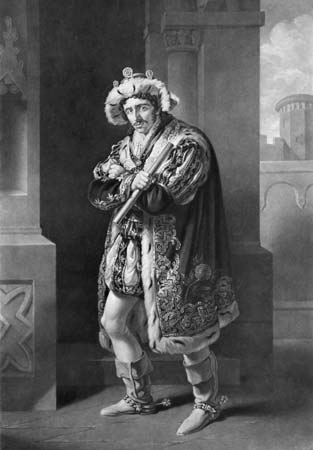Get Today in Masonic History into your Inbox. Sign up today for one of our email lists!
Need an article for your Trestleboard/Newsletter see our Use Policy
Edmund Kean is Born

Today in Masonic History Edmund Kean is born in 1787.
Edmund Kean was a British Shakespearean actor.
Kean was born on November 4th, 1787 in Westminster, London, England. Kean's family had little money, his mother was an actress though, so Kean was quickly swept up in the theatre life. At the age of 4 he made his first stage appearance as Cupid in Jean-Georges Noverre’s ballet called Cymon. He was described as a child as clever, readily affectionate and undisciplined. At the age of seven a benefactor paid for him to go to school. He found this very restrictive and signed on as a cabin boy out of Portsmouth, England. Life at sea was also restrictive and Kean took to pretending to be both deaf and lame. His "performance" was so convincing he was able to trick doctors.
When Kean returned to England he sought out his uncle, who was a mimic, ventriloquist and general entertainer. His uncle introduced him to Shakespeare. An actress, Miss Charlotte Tidswell, who knew Kean since he was an infant taught him the principles of acting. Later, when Kean's uncle passed away Miss Tidswell, took charge of Kean. Later he was adopted by a Mrs. Clarke. This was very short lived when a visitor to the Clarke household took offense to Kean and immediately left the home.
By the age of 14, Kean began playing leading characters in Shakespearean plays. This included playing Hamlet among others. Kean's fame spread quickly and he was ordered to give a Royal Performance when King George III heard of his skill. Shortly after, while performing in a circus he was performing an equestrian feat when he was thrown from the horse and broke both legs. The bones did not heal right and caused him to have selling in his feet the rest of his life. After healing from his injury he went on to study music, dancing and fencing to help improve his craft.
Until 1814, Kean struggled with becoming successful. The Drury Theatre Committee, which was on the verge of bankruptcy, signed a three year contract with Kean. His first appearance was as Shylock in Shakespeare's The Merchant of Venice. The audience was thrilled by his performance and large crowds came to see each of his performances. It is best illustrated by a quote from a letter from Jane Austen to her sister Cassandra dated 2 March 1814: "Places are secured at Drury Lane for Saturday, but so great is the rage for seeing Kean that only a third and fourth row could be got."
By 1817, Kean's temperament was causing problems. When a local playwright, Charles Bucke, submitted a play to the theatre, Kean and others eagerly received it and prepared to perform it. Kean then began to complain his part was "too small" and made other negative comments. Finally when performing another play written by Jane Porter, with whom Kean had a dispute, Kean intentionally botched the opening of the play. It was enough for Bucke and he pulled the play. Eventually it was performed, although the dispute had spread and Bucke himself added a forward to the play describing the issues he had with Kean. The play was an instant flop.
In 1820, Kean traveled to the United States performing in New York City and Boston. In the United States he got into conflict with the press. His performances though drew large crowds.
In 1825, it was the beginning of the end of Kean's career. It was discovered Kean was having an affair with Charlotte Cox, the wife of a London city alderman. Mr. Cox sued Kean for criminal conversation, more commonly known as adultery. The damages were £800. The price to his career was beyond measure. He was pelted with fruit at performances and repeatedly booed. He decided to repeat his trip to North America and as a whole was poorly received wherever he went, although in places the crowds were at least respectful. He traveled to Quebec City where he was shown great kindness by Huron Indians who attended one of his performance. It is claimed he was made an honorary chief in the tribe.
By the time Kean returned to England his health was in decline and he was largely using stimulants to keep himself going. One of his last performance was with his son, Charles Kean in Paris. While on stage Kean collapsed into his son's arms on March 15th, 1833. On May 15th, 1833, Kean passed away.
Kean was a member of Lodge St. Mark's No.102 in Glasgow, Scotland. He joined the lodge on one of his many trips to Scotland.
This article provided by Brother Eric C. Steele.

